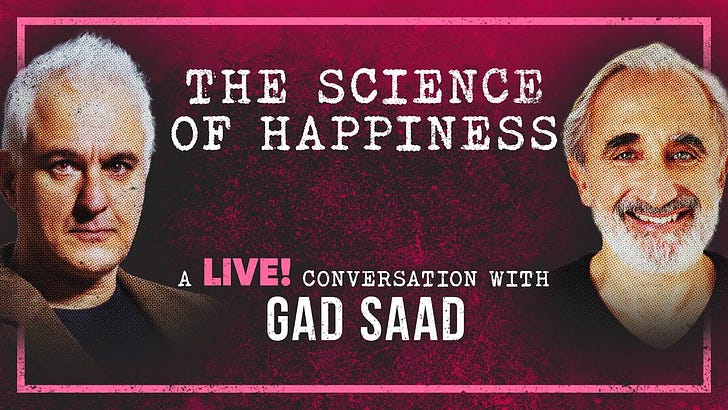Tomorrow (August 29), I’ll be livestreaming with Gad Saad at 1:00 pm PDT. Paid subscribers can ask questions in the comments below. Please direct your question to Dr. Saad.
Bestselling author and evolutionary psychologist Gad Saad is a pioneer in the application of evolutionary psychology to consumer behavior. He is a Professor of Marketing at Concordia University where he held the Research Chair in Evolutionary Behavioral Sciences and Darwinian Consumption for a decade. As a leading public intellectual, Gad writes and speaks about a wide range of ideas, including “idea pathogens” destroying logic, science, reason, and common sense. He hosts The Saad Truth podcast.
Gad is the author of the international bestseller, The Parasitic Mind: How Infectious Ideas Are Killing Common Sense, "The Evolutionary Bases of Consumption," "The Consuming Instinct," "Evolutionary Psychology in the Business Sciences," and numerous scientific papers. His latest book is The Saad Truth about Happiness: 8 Secrets for Leading the Good Life, published July 2023.



I watched this video twice and thoroughly enjoyed it. I’d like to share some thoughts on Saad’s preference to not debate creationists. First, his strategy for interacting with creationists (deplatforming) reminds me of the position of the National Center for Science Education. https://ncse.ngo/confronting-creationism
Second, I am reminded of an experience I had when I first moved away from home. At college, I began questioning what I believed and why I believed it. I asked a teacher from the church I was attending if he could provide information regarding why one should believe one historical narrative over another. He told me he was not interested in that sort of thing, and he instead preferred to focus on sharing and showing people the love of Jesus. I couldn’t fault him for wanting to focus on love, in favor of something he didn’t think was nearly as important. However, I found no satisfaction or anything useful in his answer because I wanted to examine my own beliefs and I was now no closer to knowing the trustworthiness of my beliefs. The teacher’s lack of passion for having defensible beliefs I think is best characterized as “lethargy for apologia”. I was recently listening to a conversation between Brian Keating and Eric Weinstein in which Eric sympathizes with the Dawkins perspective regarding what he calls “Jesus smuggling”.
“I believe that many of those people are responsible for prying the books open when Dawkins and Company wished to close them prematurely and I'm honestly sympathetic with the Dawkins perspective. I cannot stand what I've called 'Jesus smuggling' where you're in some very careful argument and you know you've set everything up and then somebody sort of says well, I just believe that God's love pervades everything. You're saying, "Oh brother, do I really have to listen to this?" On the other hand, going toe-to-toe with some of these religious scientists is an eye-opening experience because they are highly motivated; they know that they're heretics.” - Eric Weinstein https://youtu.be/zDTdm5ZS7gI?t=735
So, if I understand him correctly, Weinstein is using the term “Jesus smuggling” during the conversation to describe the favoring of platitudes over a formal defense of one’s claims. His description of what he means by the term reminds me of my anecdotal experience asking a religious teacher for reasons to believe one historical narrative over another. So, I think I would have to say I agree with Weinstein and Dawkins on this one, though I prefer “lethargy for apologia” over “Jesus smuggling” because I think the idea of smuggling something misses the actual point it is critiquing, which is a lack of concern for a formal defense of one's opinions or conduct (claims one makes). The interesting question raised from the quote is whether or not the other hand exists in the phrase “on the other hand”.
My question is in reference to a conversation with Jordan Peterson, in which Saad says he finds a particular argument compelling.
https://youtu.be/PTq6CYfikbg?t=4368
Suppose we discovered 10,000 self-replicating robots on another planet and 9,999 of the self-replicators could be traced to the remaining self-replicator and there are 10,000 people debating over what type of alien engineer must be responsible to explain the existence of the original robot. Each person of the 10,000 claims his or her alien is the most likely and the aliens proposed by the other 9,999 do not exist. Would it be reasonable to believe in one less engineer than all of them and conclude the engineer was not necessary?